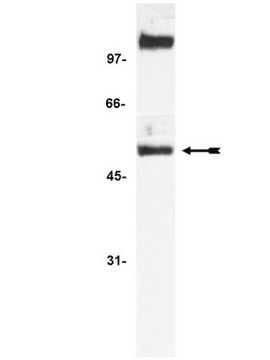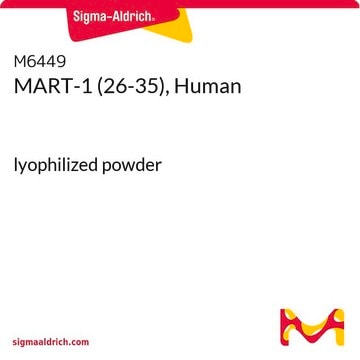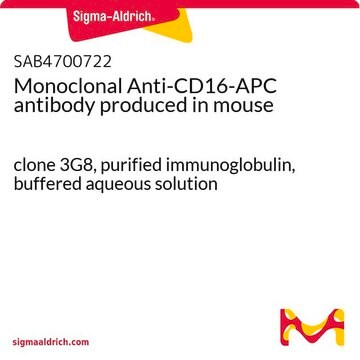SRP3321
MIF human
recombinant, expressed in insect cells, ≥98% (SDS-PAGE), ≥98% (HPLC)
Sinónimos:
GIF, GLIF, MMIF
Iniciar sesiónpara Ver la Fijación de precios por contrato y de la organización
About This Item
UNSPSC Code:
12352200
NACRES:
NA.32
Productos recomendados
General description
Macrophage migration inhibitory factor (MIF) is a small secreted protein that can act as a pleiotropic pro-inflammatory cytokine as well as an enzyme. MIF pro-inflammatory activity can be initiated by signaling through cluster of differentiation 74 and 44 (CD74 and CD44), resulting in the secretion of tumor necrosis-α (TNF-α), interleukins-1, -6, -8, and various matrix metalloproteinases (MMPs). The gene encoding this protein is localized on human chromosome 22q11.23. Insect cell derived recombinant MIF is a 15kDa protein containing 124 amino acid residues, including an N-terminal His-tag.
Biochem/physiol Actions
The enzymatic activity of macrophage migration inhibitory factor (MIF) is characterized by its ability to act as a tautomerase, capable of catalyzing the keto to enol isomerization of keto-phenylpyruvate and L-dopachrome. It appears as though MIF catalytic activity is dependent upon a trimeric configuration and a free N-terminal proline residue.
Physical form
Lyophilized from 10mM Sodium Phosphate, pH 7.0.
Reconstitution
Centrifuge the vial prior to opening. Reconstitute in water to a concentration of 0.1-1.0 mg/ml. Do not vortex. This solution can be stored at 2-8°C for up to 1 week. For extended storage, it is recommended to further dilute in a buffer containing a carrier protein (example 0.1% BSA) and store in working aliquots at -20°C to -80°C.
Storage Class
11 - Combustible Solids
wgk_germany
WGK 3
flash_point_f
Not applicable
flash_point_c
Not applicable
Elija entre una de las versiones más recientes:
Certificados de análisis (COA)
Lot/Batch Number
¿No ve la versión correcta?
Si necesita una versión concreta, puede buscar un certificado específico por el número de lote.
¿Ya tiene este producto?
Encuentre la documentación para los productos que ha comprado recientemente en la Biblioteca de documentos.
Dual role of macrophage migration inhibitory factor (MIF) in human breast cancer.
Verjans E
BMC Cancer, 9, 230-230 (2009)
Crystal J DiCosmo-Ponticello et al.
Cytokine, 69(1), 47-55 (2014-07-16)
Macrophage migration inhibitory factor (MIF) is a pro-inflammatory cytokine that was initially identified by its ability to inhibit the movement of macrophages. Cell migration is a highly complex process involving changes to the cytoskeleton and cell adhesion molecules, and is
Simona Cardaropoli et al.
Journal of interferon & cytokine research : the official journal of the International Society for Interferon and Cytokine Research, 34(7), 537-542 (2014-03-13)
Macrophage migration inhibitory factor (MIF) plays a pivotal role in pregnancy-related proinflammatory processes, such as placentation and labor. Differential MIF concentrations have been correlated with pathological events during pregnancy, such as recurrent miscarriages and severe pre-eclampsia (PE). The aim of
Yao Mawulikplimi Adzavon et al.
Cell communication and signaling : CCS, 16(1), 70-70 (2018-10-24)
Benign Lymphoepithelial Lesion (BLEL) is a rare disease observed in the adult population. Despite the growing numbers of people suffering from BLEL, the etiology and mechanisms underlying its pathogenesis remain unknown. In the present study, we used gene and cytokines
Defining minimum genomic regions of imbalance involved in testicular germ cell tumors of adolescents and adults through genome wide microarray analysis of cDNA clones.
McIntyre A
Oncogene, 23(56), 9142-9147 (2004)
Nuestro equipo de científicos tiene experiencia en todas las áreas de investigación: Ciencias de la vida, Ciencia de los materiales, Síntesis química, Cromatografía, Analítica y muchas otras.
Póngase en contacto con el Servicio técnico








